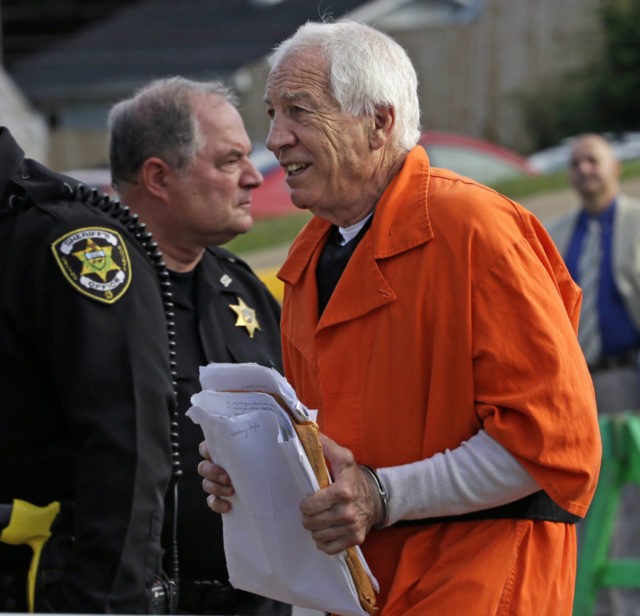Penn State indicated in a new court document that it may sue the charity founded by ex-assistant football coach Jerry Sandusky, whose 2011 arrest on child molestation charges destroyed the charity and has cost the university more than $200 million.
Penn State disclosed Friday it intends to eventually sue The Second Mile, also naming as a defendant Jack Raykovitz, who was the charity’s president when Sandusky was arrested six years go.
The civil cover sheet described it as a matter of “contractual indemnification” and said Penn State planned to pursue monetary damages. The filing did not include a complaint that would spell out specific allegations.
The university issued a statement Tuesday that said it acted “in order to preserve its rights to pursue claims” against The Second Mile. It offered no additional comment.
A spokesman for the attorney general’s office said the agency does not represent The Second Mile or its creditors, but rather is holding $728,000 in remaining assets while creditor claims are worked out. The only creditor that remains is Penn State.
“We are awaiting final disposition of its litigation to determine proper distribution of the escrowed funds,” said Joe Grace, a spokesman for the attorney general’s office.
A lawyer for one of the Sandusky victims who settled with the university has said the school retained the right to recover settlement payouts from its insurance carriers and other parties, including The Second Mile.
Messages left for Raykovitz and a lawyer who has represented him in the past were not immediately returned.
Raykovitz testified about the charity’s handling of the Sandusky scandal in March at the criminal trial of former Penn State president Graham Spanier, which ended with Spanier being convicted of a misdemeanor count of child endangerment.
Raykovitz, a psychologist, said he told several high-ranking board members of The Second Mile about a 2001 encounter that led graduate assistant Mike McQueary to notify then-head coach Joe Paterno about Sandusky attacking a boy in a shower. The scene McQueary witnessed has been a critical piece of the criminal cases and civil litigation the scandal has generated.
Raykovitz said he was told the 2001 encounter had been investigated and deemed to be unfounded.
He told jurors he advised Sandusky to wear swim trunks if he showered with children in the future.
The Second Mile did not move to keep children away from Sandusky until 2008, when it was notified that Sandusky was the target of an investigation.
Shortly after Sandusky’s arrest, Raykovitz told The Associated Press he acted appropriately at all times.
“There have always been steps in place to protect kids,” he said.
Sandusky founded the charity in 1977 as a way to help at-risk youth. Its board included many prominent business, political and civic leaders.
A judge in March 2016 allowed The Second Mile to dissolve after its lawyers said the scandal had evaporated fundraising and rendered it impossible to continue to operate.
At its peak, the charity said it was serving some 100,000 children annually through camps and fundraisers.
Sandusky, 73, is serving 30 to 60 years in prison for sexual abuse of boys, and prosecutors said he used The Second Mile to find many of his victims. He maintains his innocence and is awaiting a judge’s ruling on his request for a new trial.
The scandal has caused Penn State to pay a fortune in legal fees, NCAA sanctions, legal settlements and related costs.

COMMENTS
Please let us know if you're having issues with commenting.